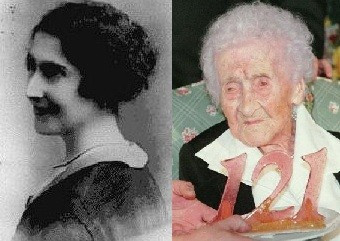Secret to Longevity: Low-Carb and Low-Calorie Diet

Many researchers have alluded to the secret of a long life. Jean Calment, the world's oldest person in 1997 when she died at the age of 122, attributed her longevity to plenty of olive oil and an occasional glass of port.
Latest research points to a calorie-restricted diet as the best way to a longer life because it delays the effects of ageing.
Scientists at the Gladstone Institutes have found that a "ketogenic diet" (low carbohydrates and low calories) produces the compound β-hydroxybutyrate (βOHB).
Eric Verdin, investigator at Gladstone, said this discovery could lead to new treatments for age-related diseases such as Alzheimer's and cancer.
βOHB can be toxic when produced in high concentrations in people with diseases such as type 1 diabetes.
However, at lower concentrations, as produced by a prolonged low-calorie diet, βOHB helps protect cells from "oxidative stress", which contributes to the ageing process.
Oxidative stress happens as cells use oxygen to produce energy. But it also releases other toxic molecules called free radicals. As cells age, they become less effective in clearing free radicals, which results in cell damage and ageing.
Eric Verdin, senior investigator at Gladstone, said: "Over the years, studies have found that restricting calories slows ageing and increases longevity - however, the mechanism of this effect has remained elusive.
"Here, we find that βOHB - the body's major source of energy during exercise or fasting - blocks a class of enzymes that would otherwise promote oxidative stress, thus protecting cells from ageing."
New treatments
The researchers looked at βOHB in human cells in a dish. They then looked at tissues taken from mice.
By monitoring the biochemical changes that took place when βOHB was administered, they found a calorie-restricted died boosts βOHB production, which blocks the activity of enzymes called HDACs.
HDACs keep a pair of genes called Foxo3a and Mt2 switched off. Increased levels of βOHB stop the HDACs from doing this, which activates the genes and starts a process that helps cells resist oxidative stress.
As well as having implications for longevity, this discovery could also point to a way of slowing down the negative effects of ageing, such as degenerative diseases.
Katerina Akassoglou, a neurological expert at Gladstone, said: "The findings could be relevant for a wide range of neurological conditions, such as Alzheimer's, Parkinson's, autism and traumatic brain injury - diseases that afflict millions and for which there are few treatment options."
Tadahiro Shimazu, lead author of the study, added: "Identifying βOHB as a link between caloric restriction and protection from oxidative stress opens up a variety of new avenues to researchers for combating disease.
"In the future, we will continue to explore the role of βOHB - especially how it affects the body's other organs, such as the heart or brain - to confirm whether the compound's protective effects can be applied throughout the body."
© Copyright IBTimes 2025. All rights reserved.






















